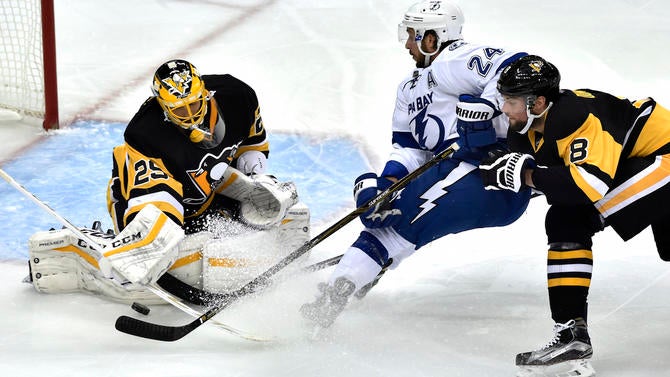Mike Sullivan's goalie gamble backfires for Penguins in Game 5
The decision of Penguins coach Mike Sullivan to start Marc-Andre Fleury in Game 5 should be questioned
PITTSBURGH -- As soon as Pittsburgh Penguins goalie Marc-Andre Fleury was cleared to play after recovering from his second concussion of the season, it seemed inevitable that he would eventually get back in the starting lineup one way or another.
But every time it seemed as if coach Mike Sullivan had a chance to turn to him, he kept coming back with Matt Murray. As Murray continued to get the call, every goal he allowed was followed by a detailed analysis of every movement he made, why he gave up the goal, and a simple question: Is it time for Marc-Andre Fleury?
Sullivan and the Penguins finally decided that Game 5 of the Eastern Conference Finals was going to be that time. It was a move that should have seemed like a pretty big gamble if for no other reason than the simple fact Fleury had played only one period (the third period of Game 4) since the end of March, and another goalie had played well enough to get them this far in the playoffs.
The gamble did not work.
Thanks to Tyler Johnson's backside and an impressive 31-save performance by Andrei Vasilevskiy at the other end of the ice, the Tampa Bay Lightning were 4-3 winners in Game 5 and were able to take a 3-2 series lead and give themselves an opportunity to win the Eastern Conference for the second successive year on Tuesday night.
If there was one player in the Penguins lineup that needed a big game on Sunday, it had to be Fleury.
He needed it for his coach to validate the decision to go away from his starting goalie from the past month-and-a-half to one who had not started a game in nearly two months. He needed it for himself, if for no other reason than to help change the storyline that is going to continue to follow him around until he does something to rewrite it.

He did not do that on Sunday.
When it comes to the postseason storyline, it is all pretty simple. Even though Fleury is a Stanley Cup champion, his postseason play since that championship seven years ago has not been good. The numbers speak for themselves. Since the start of the 2010 playoffs (the year after winning the Cup) his postseason save percentage was only .896 entering Sunday. Of the 23 goalies who played in at least 20 playoff games during that stretch, only Ilya Bryzgalov and Evgeni Nabokov have been worse.
The Penguins' two deepest postseason runs since then (2013 to the Eastern Conference finals and this year) have come with other goalies in net (Tomas Vokoun replaced Fleury early in the first round in 2013 and played the rest of the way, while the combination of an injury and the strong play of Murray kept Fleury sidelined until Sunday this postseason). They have won only two series with Fleury in net since then. Vokoun and Murray have combined to win four during that same stretch.
Given that history the worst possible outcome for Fleury on Sunday, and in this series, would be for him to come back in after another goalie helped them get to this point and have everything suddenly go south for him and the team, whether it was his fault or not.
Let's get this straight: There are a lot of reasons for the outcome on Sunday, and they are not all on the Penguins' goalie.
Tampa Bay deserves a ton of credit because it is an outstanding team that is as opportunistic as any team in the league. When the Lighting create a chance, they tend to bury it. Their goalie was outstanding (he was the best goalie on Sunday and has been the best goalie to play in this series). When the Penguins had a chance to perhaps put the game away with a 2-0 lead and a power play, they failed to score and then let Tampa Bay score a pair of goals in 90 seconds to tie the game. Kris Letang played what was perhaps his worst game of the playoffs, if not the entire season.
But it was pretty clear as the game went on that Fleury was not going to be a difference maker for the Penguins.
The Alex Killorn goal to start the scoring for Tampa Bay was a perfectly placed shot. But it was also a from outside the faceoff dot, from a bad angle, and one that Fleury had an unobstructed look at. Yeah, it is a terrific shot. But it is also a shot you probably want to see get stopped.
Fleury himself admitted after the game he had to be better on that goal. Things continued to unravel from there when the Lightning tied it on this goal from Nikita Kucherov, his first of the night.
Namestnikov to Kucherov. #StanleyCup#PITvsTBLpic.twitter.com/fWzbjDx6x3
— #StanleyCup Playoffs (@NHL) May 23, 2016
The weird thing about Sunday's game is that for as sloppy as the Penguins looked at times, and for as good as the Lightning looked, the Penguins did a fairly decent job insulating their goalie. They allowed only 25 shots to get on goal and blocked 22, including a couple early in the game that could have easily been goals when the Lightning had Fleury down and out.
A lot of times, it was on the plays where he did not give up goals where he looked to be at his worst. With five minutes to play in regulation and the Penguins trying to protect a 3-2 lead, Ryan Callahan fired an innocent looking shot off the rush from just on top of the circle and beat Fleury, only to see the shot hit the goalpost (one of four posts the Lightning would hit on the night).
The fact that shot even made it to the post had to be a concern, and it seemed to rattle Fleury because every shot after that was an adventure.
Now the Penguins are facing a tough situation on Tuesday in Game 6. Not only are they facing elimination for the first time this postseason, they are going to once again be facing an impossible question in net.
Do they go back to the goalie that helped them get to this point but had been starting to cool off in recent games, or do they stick with the veteran who did little to inspire confidence on Sunday and give him another opportunity to help rewrite his playoff story?
If you thought the goalie situation was a question mark and a controversy before Sunday, the day off on Monday between Game 5 and Game 6 on Tuesday is going to be an entirely new level.


















